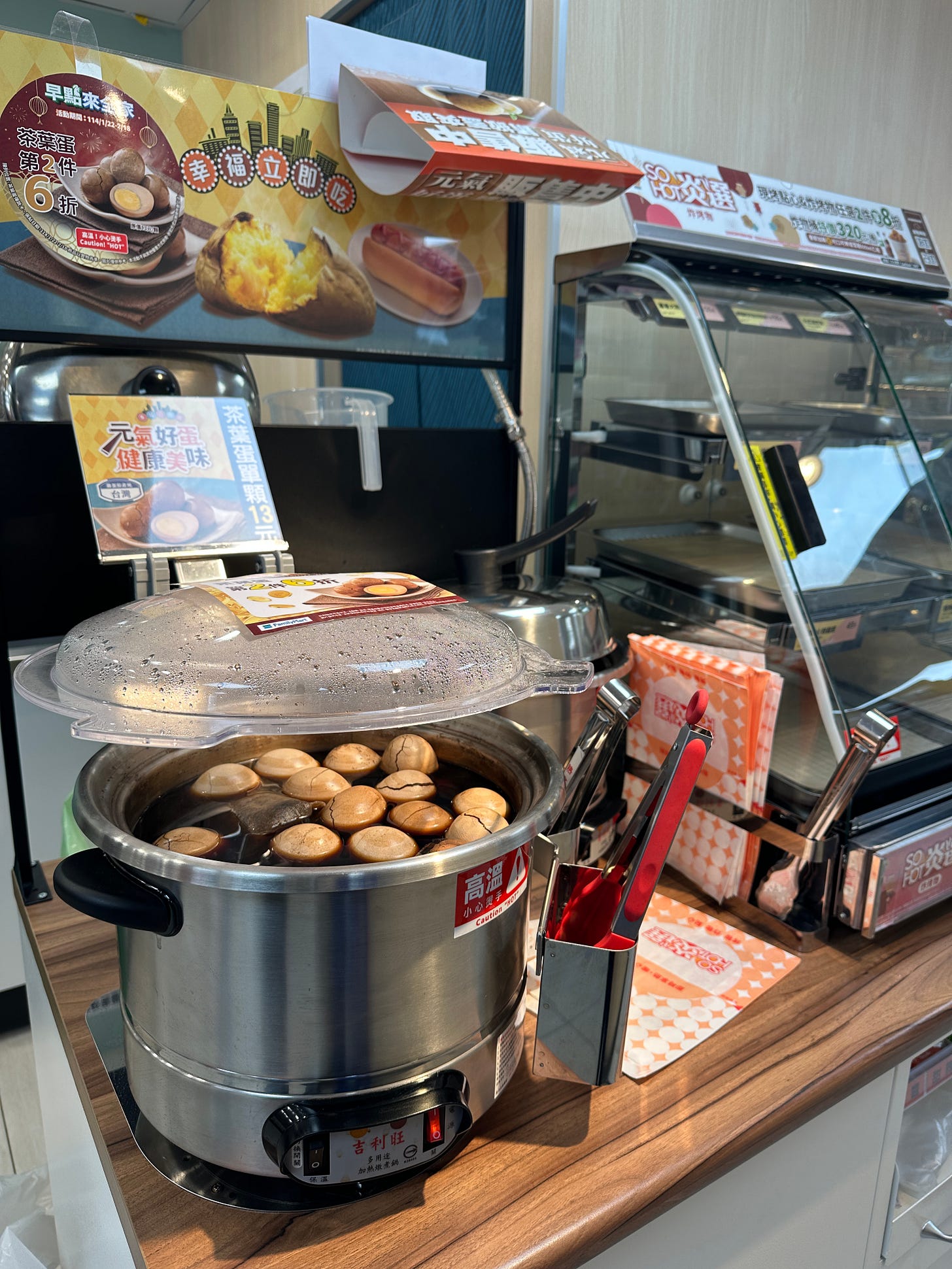Alone Together: How Konbini Fight the Loneliness Epidemic
How Taiwan’s 24/7 convenience stores became a refuge for the lonely and the lost.
It’s a cold night. The Lunar New Year hushes the city. A Tuesday that drifts like a Sunday—slow, muted. Everything is closed.
Except for the konbini.
Convenience stores double as lighthouses in the dark, cutting through the stillness.
The green and blue glow of a FamilyMart pulls me in. I step inside and find something I didn’t know I needed.
At first, they just seemed to be everywhere.
Now, I know better. They appear when I need them, as if the city planted them like seeds, knowing exactly where its people would need shelter.
Sometimes, two or three coexist on the same block. Always open. Always glowing.
Inside, a microwave hums, heating a plastic tray of rice. In the glass steamer, sweet potatoes glisten under the golden light from a heat lamp. Eggs float in a liquid as dark as forgotten tea, their shells cracked like ancient maps, promising a taste as mysterious as their color.
The shelves overflow with anything and everything: snacks with names I can’t pronounce, umbrellas that look like toys, thick socks, and even underwear.
WiFi, a bathroom, an ATM, power outlets, and a printer. The konbini has everything for the lonely, the desperate, and the stranded—things we’re too vulnerable to admit we need.
Outside, the wind cuts like a knife, and the streetlights cast long shadows on the empty pavement. Inside, the world shrinks—warm, safe.
I could buy something to eat and head back to my hotel, but I choose to stay. I prefer this communal oasis, shared with strangers, over the silence of my room.
A girl in a Pikachu beanie spins a pen between her fingers. Her notebook is filled with equations, but her eyes show she’s somewhere else.
A couple sits by the window, laughing between sips of bubble tea. He plays with his straw, chasing the last black tapioca pearl. She watches, amused, as if the night could end if they stopped laughing.
A short, bald man in his forties sits in the back, flipping through a manga while his phone charges. Or maybe he’s charging his phone while enjoying his manga. Impossible to tell.
What are all these people doing here instead of at home? I travel alone—I have an excuse. What about them? What brings them here?
The konbini is more than a store. It’s a quiet refuge, a limbo between home and the street—what one sociologist called a “third place,” where strangers become temporary neighbors. A place where people study, eat, or simply exist.
No one rushes you. No one kicks you out.
As soon as you step in, the air changes. It smells of freshly brewed coffee and the steam from a bao filled with who-knows-what. I sit in a corner, a ham and cheese toastie in one hand and a black tea in the other. The tea burns my cold fingers through the cardboard cup, but I like how it feels.
FamilyMart’s jingle chimes every now and then. It doesn’t annoy me. If anything, it lifts my mood. It makes you feel like you belong, while the rustling of plastic bags mixes with the murmurs of people coming in and out.
Everyone here is in their own world. Alone, yet together. No one gives you a funny look; no one questions you. Here, existing is enough.
The konbini never closes. Never turns its back on you. Not when the city sleeps, not when you forget how to.
7-Eleven and FamilyMart own the corners. Like Coca and Pepsi, like McDonald’s and Burger King. A rivalry in which I haven’t picked sides yet. Tonight, my favorite is whichever is the closest. Maybe, in time, I’ll grow loyal to one. But not for the products—for what they represent.
A place that asks for nothing and gives you everything.
The konbini makes me feel a familiarity I shouldn’t. Why does this feel like a homecoming when the labels look like hieroglyphs, and even the pictures on the packages are enigmas to me? Maybe it’s the store’s layout, designed so that everything is within effortless reach. Or the kindness of the cashiers, greeting me with a slight bow and repeating words I don’t understand—but somehow, they reassure me.
Language doesn’t matter here. I know exactly what to do. I walk through the aisles on muscle memory, as if I’ve known this place forever. A home that’s never been mine but feels like it could’ve been. A place where you can get lost without feeling lost.
When I leave, I realize I didn’t buy much, but I walk away with something else. Something that has no price and can’t be put inside a bag.
I step back into the night with the certainty that, for a moment, I wasn’t alone. In a world that mistakes connection for Wi-Fi, sometimes that’s enough.
On nights like this, the konbini isn’t just a store. It’s an emergency room for the loneliness epidemic. And in these fractured times, we are all solo travelers.
They didn’t sell me a cure because that’s not something you can put inside a bottle. But for the price of a cup of tea, they gave me twenty minutes where I felt like I wasn’t the only one lost inside this world.
Maybe that’s why I always choose the largest cup.





Got to love Taipei!
That feeling when everything else is closed, and you’re hungry or cold or need to use the bathroom, and then you see the konbini sign… truly “a lighthouse in the dark,” as you put it. Great piece, Pablo, traveling through East Asia, these stores never let me down. 😌